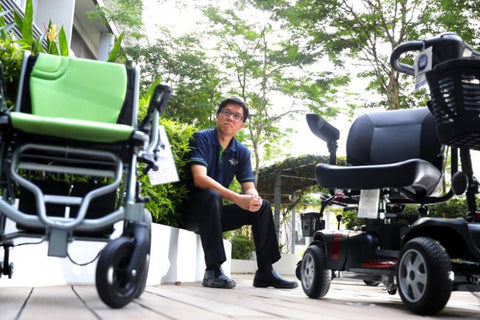
Mr Warren Chew (above), managing director of Falcon Mobility, said that if current weight restrictions on personal mobility devices are extended to personal mobility aids (PMAs), many legitimate PMAs sold here will become illegal.ST PHOTO: KELVIN CHNG
Disabled community, retailers concerned about future restrictions on mobility aids
(Source: By Low De Wei, Jolene Ang | The Straits Times | Singapore | 27 July 2018)
SINGAPORE - The disabled community has expressed concerns that restrictions being considered for personal mobility aids (PMAs) could be onerous and cause inconvenience to handicapped and elderly users.
Retailers and an organisation have urged the Active Mobility Advisory Panel - set up in 2015 to discuss such issues - to consider the genuine needs of users and proposed lower speed limits for the devices to prevent them from being used for the wrong reasons.
They raised the issue after the panel's chairman, Associate Professor Muhammad Faishal Ibrahim, posted on Facebook that some retailers have been marketing non-compliant personal mobility devices (PMDs) with seats as personal mobility aids (PMAs).
Dr Faishal, who is also Senior Parliamentary Secretary for Education and Social and Family Development, said the advisory panel is looking into this issue to prevent able-bodied people from using the devices dangerously.
Under current rules, PMDs like electric scooters and hoverboards cannot exceed 15kmh on pedestrian-only paths. The maximum speed for PMDs on cycling and shared paths is 25kmh. Additionally, they cannot be used on roads and must have their maximum attainable speed capped at 25kmh.
PMDs also cannot weigh more than 20kg nor measure wider than 70cm.
Users of PMAs - such as motorised wheelchairs and mobility scooters - follow similar rules but are exempt from the weight, width and maximum speed requirements, lawyers say. PMD and PMA users who flout the rules can be fined or jailed.
Mr Denis Koh, a member of the 14-member panel, said there have been cases of able-bodied people modifying PMAs as well as retailers selling PMDs as PMAs.
Some users even added seats to PMAs so they could take their children to school on them, while others have tweaked PMAs to increase their speed.
"After modifications, the devices become more bulky and go much faster," said Mr Koh.
Mr Warren Chew, managing director of Falcon Mobility, said that if current weight restrictions on PMDs are extended to PMAs, many legitimate PMAs sold here will become illegal. "I've heard some suggestions to implement user registration or (require) medical certification before people can buy PMAs," he said, adding that such restrictions will only impose additional inconvenience and costs on users.
Ms Vanessa Keng, the co-founder of The Golden Concepts, an e-commerce store that sells motorised wheelchairs, said she hopes that any new regulations will not impact elderly users who have few reliable mobility options to choose from.
"It's difficult to regulate this. How do you classify and pinpoint who needs a PMA to get around?" said Ms Keng.
Mr Segar Lais, 50, a technician who has used a motorised wheelchair for five years due to a spinal injury, said disabled and elderly users may sometimes add extra weight to their PMAs through modifications, such as seat adjustment mechanisms which are necessary to help them get on and off the PMA or ride it comfortably.
The Handicaps Welfare Association (HWA), which has more than 2,000 disabled members, supports a speed restriction on such devices.
Its president Edmund Wan hopes the panel will consult his organisation before recommending new restrictions.
"If we are talking about strict restrictions on modifying them or having to send them for yearly inspections, it will be an inconvenience," said Mr Wan, adding: "How many people can you spare to enforce (the restrictions)? Ultimately, the answer lies in changing mindsets through education to encourage users to use their devices safely."
Click here to view the original article
-------------------------------------------

